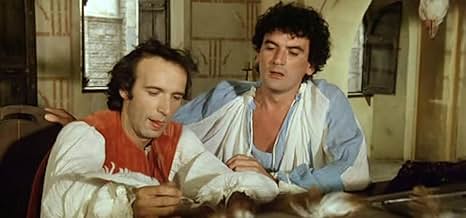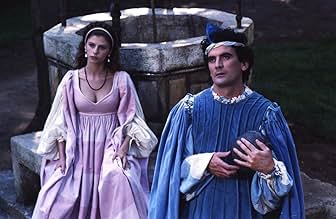Non ci resta che piangere
- 1984
- 1h 53min
CALIFICACIÓN DE IMDb
7.6/10
7.6 k
TU CALIFICACIÓN
Agrega una trama en tu idiomaIn the 80s, two friends misteriously wake up in the XV century and clumsly try to intermingle with the society of the time.In the 80s, two friends misteriously wake up in the XV century and clumsly try to intermingle with the society of the time.In the 80s, two friends misteriously wake up in the XV century and clumsly try to intermingle with the society of the time.
- Dirección
- Guionistas
- Elenco
- Premios
- 1 nominación en total
Opiniones destacadas
I like the Italians, most of all, but I do not like Massimo Troisi and Roberto Benigni, for me are the most annoying actors ever. Troisi, you do not understand what he says, in all the films he speaks in a kind of dialect that only he understands. In all the movies is the same, boring at the top. You got to have a great deal of steel patience and great love for cinema to watch this movie in its entirety. Troisi and Benigni, who are also directing, are not genius and are not funny at all.
10AleGenoa
Sadly, the only occasion we had to see together two of the best italian actors of the century: Benigni and Troisi. Anyway, it's a comedy: there's nothing else to do, but laugh.
Roberto Benigni and Massimo Troisi are two of the most important Italian comedians of their generation, who ended up being recognized internationally with their masterpieces, "La vita è bella" by Benigni (1997) and "Il Postino" by Troisi (1994), the latter consecrated after his death.
Until they reached the pinnacle of their careers, they went through a series of films where, assuming the role of comedians, they made funny comedies, but of limited content. It's a bit the fate of comedians, to make the public laugh until they finally get autonomy and courage to make a serious comedy, where the laughter is poetic and the wit is intelligent. These two ended up making it and getting the right recognition, which doesn't always happen.
In this four-hand project, the script is weak and even the comedy, with some amusing moments, relies more on the improvisation capacity of the two actors than on situations or previously written dialogues. Above all, it is worth by the natural grace of these two clowns, of unique quality, who are always a pleasure to see perform.
Until they reached the pinnacle of their careers, they went through a series of films where, assuming the role of comedians, they made funny comedies, but of limited content. It's a bit the fate of comedians, to make the public laugh until they finally get autonomy and courage to make a serious comedy, where the laughter is poetic and the wit is intelligent. These two ended up making it and getting the right recognition, which doesn't always happen.
In this four-hand project, the script is weak and even the comedy, with some amusing moments, relies more on the improvisation capacity of the two actors than on situations or previously written dialogues. Above all, it is worth by the natural grace of these two clowns, of unique quality, who are always a pleasure to see perform.
10p13r0
Two actors at their best (Roberto Benigni before he became big-headed after the world wide fame and the late lamented Massimo Troisi) playing a strange story, where these two young modern men wake up in 1492 after spending a night out because their car broke down.
Settled in the italian reinassance, pretty well depicted despite the low budget used, the movie is substantially a collection of sketches based on the struggles that the two men must fight against the different lifestyle, with some secondary stories based on historical personages lived in that time (Savonarola, Columbus, Da Vinci). This is one of the most beloved italian movie of all the times, and everybody saw this movie can remember all of the most famous dialogues (Vitellozzo after the death of his brother, the "remember that you shall die!" speech, the scene at the customs, and many others) by hearth, as they were funny and innovative.
Directed with a very slow rhythm, that adds a quite poetic touch to the story, this movie must be considered as a small masterpiece, a comedy unique of its kind. Comparing this with one of the later italian comedy should be done to understand the meaning of the term "good taste".
Unluckily, anybody without a very fluent italian can't completely enjoy this movie, because a big part of the funny side of this movie follows from the two heavy accents of the two main actors, mainly the one of Troisi.
Settled in the italian reinassance, pretty well depicted despite the low budget used, the movie is substantially a collection of sketches based on the struggles that the two men must fight against the different lifestyle, with some secondary stories based on historical personages lived in that time (Savonarola, Columbus, Da Vinci). This is one of the most beloved italian movie of all the times, and everybody saw this movie can remember all of the most famous dialogues (Vitellozzo after the death of his brother, the "remember that you shall die!" speech, the scene at the customs, and many others) by hearth, as they were funny and innovative.
Directed with a very slow rhythm, that adds a quite poetic touch to the story, this movie must be considered as a small masterpiece, a comedy unique of its kind. Comparing this with one of the later italian comedy should be done to understand the meaning of the term "good taste".
Unluckily, anybody without a very fluent italian can't completely enjoy this movie, because a big part of the funny side of this movie follows from the two heavy accents of the two main actors, mainly the one of Troisi.
A real masterpiece by Benigni and Troisi. The plot is very simple and there are no special effects. However, what earns this book a place in history books is the outstanding acting performance of these two comedians. You can see from the beginning that most of the sketches are improvisations; their acting is so natural and clean. The reason why it did not gain international recognition is because it cannot possibly transmit the same emotions with with subtitles. Translation becomes nonsense in a movie that is so culturally-bound. I wish I could recommend it to everybody, but I must say that you really need to understand Italian plus some Neapolitan and Florentine dialect in order to appreciate it in its entirety. Besides, you also need to know a little bit about the culture and history of Italy. In Italy, this was, is and will always be an outstanding piece of art.
¿Sabías que…?
- TriviaThe screenplay is the main guideline for the film but many dialogues were improvised by Troisi and Benigni.
- Citas
[last lines]
Saverio: Look! A train! I told you we would return to the present!
Mario: I'm not marrying Gabriellina!
Saverio: Oh yes you are!
Leonardo da Vinci: Engineers! TRAIN!
Leonardo da Vinci: For God's sake! 33%... 33%... and 33%...
[cut to a shot of the train and freeze as the film ends]
- ConexionesEdited into Bellissimo: Immagini del cinema italiano (1985)
- Bandas sonorasNel blu dipinto di blu
Written by Domenico Modugno and Franco Migliacci
Selecciones populares
Inicia sesión para calificar y agrega a la lista de videos para obtener recomendaciones personalizadas
- How long is Nothing Left to Do but Cry?Con tecnología de Alexa
Detalles
- Fecha de lanzamiento
- País de origen
- Idiomas
- También se conoce como
- Nothing Left to Do but Cry
- Locaciones de filmación
- Productoras
- Ver más créditos de la compañía en IMDbPro
Contribuir a esta página
Sugiere una edición o agrega el contenido que falta

Principales brechas de datos
By what name was Non ci resta che piangere (1984) officially released in Canada in English?
Responda























